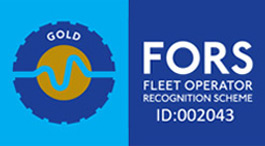Back to Listing
The Cost Of Fly Tipping To UK Local Authorities

Fly-tipping represents a significant environmental and economic challenge for local authorities across the UK. This illegal act involves the unauthorised disposal of waste on land that is not licensed to receive it, ranging from a single bag of rubbish to large quantities of waste dumped on private or public property. The repercussions for communities are far-reaching, encompassing not just the unsightly degradation of local environments, but also presenting health hazards and a substantial financial strain on local councils that are responsible for clean-up operations.
For the year 2022 to 2023, fly-tipping incidents in England slightly decreased from the previous year; however, the problem still translates into a considerable cost burden for local authorities. Around 1.08 million fly-tipping incidents were reported in this period, each necessitating a response that includes investigation, clearance, and potential legal action. As the figures indicate, the issue continues to prevent local authorities from allocating their already stretched resources more efficiently towards other essential community services.
Councils are compelled to employ a variety of measures to tackle the issue. This spans from promoting awareness and encouraging proper waste disposal to implementing deterrents like fines and surveillance. Yet, as reports suggest, the percentage of household waste involved in fly-tipping incidents remains high, and the most common locations for fly-tipping are pavements and roads, which speaks to the persistent nature of the problem and the need for continued vigilance and robust enforcement. The financial implications are stark as well, with many councils spending significant sums each year to address the various aspects of fly-tipping.
Understanding Fly-Tipping
Fly-tipping poses a serious economic and environmental challenge across the UK, with an impact on both urban and rural areas. This destructive activity not only spoils the beauty of local communities but also incurs significant costs for local authorities tasked with clean-up operations.
Definition and Scope
Fly-tipping, the illegal deposit of waste on land that does not have a licence to receive it, is a significant problem in England. It ranges from a single bag of household rubbish to large quantities of waste dumped by trucks. Fly-tipped waste is often found in back alleys, by the roadside, or on private land and can include general household refuse, large domestic items like fridges and mattresses, as well as hazardous materials.
Legislation, specifically the Environmental Protection Act 1990, is in place to tackle fly-tipping. This Act defines the legal framework within which waste can be safely managed and describes fly-tipping as a criminal offence, which carries a hefty fine and potentially a prison sentence. The scope of the problem is substantial, with instances of fly-tipping reported in the millions during the 2022/23 year according to government statistics.
Legislation and Regulations
The UK has several legislative and regulatory measures to control and reduce fly-tipping. Under the Environmental Protection Act 1990, Local Authorities and the Environment Agency are the primary bodies responsible for investigating and taking action against fly-tipping offences. Penalties for offenders can include fines of up to £50,000 or an order to pay the costs incurred by the authority in removing, storing, and disposing of the waste. Additionally, vehicles used in fly-tipping can be seized and destroyed.
Efforts to enforce these regulations are ongoing, with the aim of deterring potential offenders through the risk of significant financial penalties and custodial sentences. Despite these measures, local authorities continue to face the challenge of enforcing the law and preventing fly-tipping due to the costs and resources required.
Impact on Local Authorities
The cost of fly-tipping in England imposes a substantial financial strain on local authorities, and significant resources are allocated each year to address this persistent issue.
Financial Burdens
For the financial year 2022/23, local authorities in England faced expenses stemming from 1.08 million fly-tipping incidents. The financial pressure was considerable, as the cost of clearance for large fly-tipping incidents alone was substantial. Councils found themselves outlaying funds not just for removal, but also for the investigation and enforcement actions necessary to combat illegal dumping.
Resource Allocation
Beyond direct monetary costs, local authorities must allocate human resources to manage fly-tipping. This involves teams dedicated to clearance, investigation, and legal processes. The diversion of these resources to tackle fly-tipping means local councils potentially have to redirect efforts away from other vital community services. Moreover, the enforcement actions taken by local authorities represent a significant investment in manpower and time, illustrating the persistent nature of the problem.
Fly-tipping remains a critical challenge for local authorities in England, where managing waste responsibly and cost-effectively is imperative. Despite ongoing efforts to reduce incidents, councils continue to face the hefty task of keeping communities clean and safe from the blight of illegal waste dumping.
Environmental Consequences
Fly-tipping poses a substantial threat to the environment in the United Kingdom, affecting natural habitats, wildlife, and the aesthetics and safety of both rural and urban areas.
Habitats and Wildlife
Fly-tipping can devastate natural habitats, where illegally disposed waste can introduce hazardous substances into ecosystems. Toxic materials from waste can leach into soil and watercourses, causing long-term damage to plant life and posing serious health risks to local wildlife. Discarded waste also disrupts natural behaviours, as animals may forage in dangerous items, leading to injuries or poisoning.
Rural and Urban Distinction
In rural areas, fly-tipping not only blights the picturesque landscape but also impacts agricultural practices by contaminating farmland. This illegal dumping can obstruct waterways leading to increased flood risks. Conversely, urban fly-tipping often accumulates in alleyways or vacant lots, attracting vermin and presenting fire hazards. In both settings, the presence of waste undermines the enjoyment and use of the environment by the public.
Economic Implications
The economic implications of fly-tipping are considerable for UK local authorities. This illegal activity affects not only the aesthetics but also the financial health of communities, with significant costs incurred for clean-up and its impact on property values and agricultural productivity.
Property and Land Value
Fly-tipping can lead to a decrease in property and land value in affected areas. Waste that is illegally dumped can become a blight on local neighbourhoods, affecting the desirability of the region for potential buyers and investors. Properties close to frequent fly-tipping spots may see their value diminish compared to those in cleaner areas, as prospective residents and businesses often seek locations that maintain high environmental standards.
Agricultural Losses
For farmers and landowners, the cost of fly-tipping can be twofold. There is an immediate financial impact incurred through the cost of clearing waste from their land, which in some cases includes hazardous material requiring specialised disposal. Additionally, instances of fly-tipping can result in loss of agricultural productivity, as affected land may become unusable for a period, disrupting farming schedules and yields. This represents not only a financial burden in terms of clean-up costs but also potential revenue lost from crops or livestock.
Human Health and Safety
Fly-tipping, the illegal disposal of household waste and other types of waste, poses significant risks to public health and safety, particularly when hazardous materials are involved.
Public Health Concerns
Fly-tipping creates unsightly waste piles that become breeding grounds for pests, which are carriers of diseases. Rodents, often found in these environments, can spread bacteria, viruses, and parasites, endangering public health. Moreover, illegally dumped waste can lead to the contamination of soil and waterways, affecting not only the ecosystem but also the health of local communities who may come into contact with these areas.
Hazardous Waste Issues
When hazardous waste—like chemicals, asbestos, or electronic items—is fly-tipped, it presents acute health risks. Improperly discarded materials can leach toxic substances into the ground, polluting the earth and groundwater. Contact with hazardous waste can lead to serious health problems for individuals, including skin rashes, respiratory issues, or even more severe conditions if toxins are ingested or inhaled. Local authorities must manage these dangers by investing in clean-up efforts and proper disposal methods to mitigate health threats.
Enforcement and Penalties
UK local authorities are tasked with enforcing laws to deter and penalise fly-tipping offences. These efforts are supported by various legal mechanisms, each designed to hold perpetrators accountable and dissuade future incidents.
Court Actions
When an alleged violation of fly-tipping regulations is significant, local councils may pursue prosecution in court. Defendants found guilty face substantial court fines, which can be unlimited for the most egregious offences committed by individuals or companies. In the year 2021/22, English local authorities dealt with 1.09 million fly-tipping incidents, demonstrating the scale of legal action required.
Fixed Penalty Notices
Local authorities commonly issue Fixed Penalty Notices (FPNs) as an immediate punitive measure for less severe fly-tipping violations. An FPN can be a more efficient alternative to court proceedings, offering a quicker resolution and lessening the burden on the legal system. These notices carry fines which, while not as substantial as court-imposed penalties, are nonetheless significant and contribute to the deterrence strategy. The legal powers available to local authorities enable them to set the penalty amount, which can provide an effective tool for tackling fly-tipping locally.
Prevalence of Fly-Tipping Incidents
Fly-tipping remains a significant issue for local authorities in the UK, with a notable number of incidents and considerable costs associated with cleanup efforts.
Statistical Analysis
For the year 2022/23, local authorities in England reported dealing with approximately 1.08 million fly-tipping incidents, reflecting a marginal decrease from the previous year's figure of 1.09 million. This indicates that fly-tipping continues to plague many areas, albeit with a slight improvement in the frequency of occurrences.
Size Category Variation
The size category of fly-tipping incidents showcased a concerning trend. Of all incidents recorded, around 4% were classified as "tipper lorry load" size or greater, a substantial increase from the previous year. This larger category of illegal waste dumping not only exacerbates environmental damage but also substantially inflates the costs borne by local authorities.
For a more detailed understanding, the following summarises the composition of incidents by size:
Small (bagged waste, single items): Majority of cases
Medium (van load): Less frequent but pose notable issues
Large (tipper lorry load or larger): Least common but account for higher cleanup costs
Local authorities in England faced a total expenditure of £13.2 million on clearing large fly-tipping incidents in the year 2022/23, underscoring the financial burden imposed by illegal dumping activities.
Prevention and Education
The fight against fly-tipping in England requires strategic prevention and education measures. Targeted awareness campaigns and active community involvement are essential in reducing the problem.
Awareness Campaigns
Authorities implement awareness campaigns to inform the public about the legal, environmental, and societal ramifications of fly-tipping. These campaigns often utilise various media outlets for widespread reach, including online platforms, local newspapers, and public service announcements. Educational materials provide guidance on proper waste disposal and the hefty fines associated with illegal dumping.
Campaigns also highlight the cost of fly-tipping to taxpayers, with recent figures indicating a decrease in incidents, which may signal their efficacy. They must continually adapt to the changing dynamics of waste disposal behaviour and leverage the power of social proof—people's natural inclination to conform to the actions of others—to promote responsible waste management.
Community Involvement
Community involvement serves as a critical pillar in preventing fly-tipping. Local authorities often encourage residents to report sightings of illegal dumping and participate in community clean-up events. Such involvement fosters a shared responsibility for the local environment and helps in the early detection and swift removal of dumped waste, consequently reducing potential hazardous effects.
Additionally, education programs in schools and community centres about the importance of sustainable waste management can nurture a culture of environmental responsibility from an early age. By participating in these initiatives, community members become ambassadors for change, transforming their collective attitude towards waste disposal and further reducing fly-tipping.
Waste Management Strategies
Local authorities in the UK have been actively formulating strategies to tackle fly-tipping, with a particular focus on enhancing recycling initiatives and improving waste disposal solutions. These strategies are crucial in managing the financial burden of illegal waste disposal on the authorities and the environment.
Recycling Initiatives
Local councils are investing in recycling centres and campaigns to increase public awareness about the benefits of recycling. By offering more convenient and efficient recycling services, they encourage residents to dispose of waste responsibly. For instance:
Enhanced Collection: Many areas have implemented kerbside recycling collections for a variety of materials, ensuring easy access to recycling for all residents.
Specialised Recycling Centres: Targeted facilities are established for specific types of waste, like electronics or hazardous materials, ensuring they are handled properly.
Enhanced Collection: Many areas have implemented kerbside recycling collections for a variety of materials, ensuring easy access to recycling for all residents.
Specialised Recycling Centres: Targeted facilities are established for specific types of waste, like electronics or hazardous materials, ensuring they are handled properly.
Waste Disposal Solutions
In response to fly-tipping, councils have developed a range of waste disposal solutions aimed at simplifying the process for businesses and residents:
Zero-to-Landfill Solutions: Service providers like Eco-friendly Waste Management focus on diverting waste from landfills, opting for recycling and recovery wherever possible.
Hazardous Waste Management: Companies such as Stericycle offer specialised disposal services for hazardous waste, ensuring that it does not contribute to the fly-tipping problem.
Through these focused strategies, UK local authorities are working to reduce the economic impact of fly-tipping and promote a more sustainable approach to waste management.
Case Studies
This section delves into specific instances of local authorities addressing the challenge of fly-tipping. It covers both successful strategies and the important lessons that have emerged from various approaches.
Local Success Stories
Essex has seen noteworthy achievements in tackling fly-tipping. In Essex, multi-agency partnerships have been instrumental, demonstrating the effectiveness of collaborative efforts. They have amalgamated resources from the local government with those of environmental groups and law enforcement to identify and prosecute offenders, serving as a deterrent against future instances of fly-tipping.
In Manchester, the adoption of new technologies for waste surveillance has been a game-changer. With the implementation of CCTV monitoring in hotspots, Manchester has not only reduced fly-tipping incidents but also increased the rate of prosecutions, reinforcing the city's commitment to keeping its neighbourhoods clean.
Lessons Learnt
The London School of Economics (LSE) has conducted in-depth analyses on fly-tipping and its impacts. One key takeaway is the importance of education and public awareness campaigns. Addressing the issue of fly-tipping requires changing public attitudes towards waste disposal and increasing awareness about the legal and environmental repercussions of incorrect waste disposal practices.
Furthermore, studies by LSE highlight the need for more robust data collection and sharing among local authorities to predict and prevent fly-tipping. Better data leads to more informed decisions, helping to allocate resources more efficiently and tailor responses to specific community needs.
Future Outlook
Looking ahead, the landscape of fly-tipping and its economic impact on UK local authorities is set to evolve, influenced by robust government policies and technological advancements. These developments are likely to shape the efficacy and cost-effectiveness of tackling this persistent issue.
Government Policies
The UK Government and specifically the Department for Environment, Food & Rural Affairs (Defra) continue to hone their strategies to combat fly-tipping. They are prioritising research and piloting new approaches to enforcement and prevention. An increase in fixed penalty notices and adjustments to existing legislation can be anticipated. These actions represent a commitment to rigorous policy frameworks aimed at significantly reducing the financial burden on local authorities.
Technological Advances
Technological innovations offer promising solutions to identify and prevent illegal waste disposal. Local councils are exploring advanced surveillance systems, including drones and AI-powered cameras that can detect fly-tipping activities. Additionally, the use of big data analytics can help in understanding patterns and hotspots for targeted clean-up operations. These technological tools are vital for reducing the incidence of fly-tipping and its associated costs.
Frequently Asked Questions
This section addresses key concerns about the fiscal impact of fly-tipping and the measures taken by UK local authorities to mitigate this problem.
How much does fly-tipping cost local authorities in the UK annually?
Fly-tipping poses a significant financial burden on UK local authorities, amounting to nearly £400 million in the year 2020/21, representing an 87% cost increase over four years. This figure includes the cost of clearance, enforcement, and investigation.
What are the latest statistics on fly-tipping incidents in UK local authorities?
Local authorities in England reported a slight decrease in fly-tipping incidents with 1.08 million cases in 2022/23, a 1% reduction from the 1.09 million incidents in 2021/22. This follows a previous year-on-year decrease.
What measures do UK councils employ to combat fly-tipping?
UK councils use various strategies to tackle fly-tipping, including surveillance technologies, enforcement actions, and educational campaigns. Collaboration with the Environment Agency is also part of the comprehensive approach against illegal dumping.
What is the typical fine imposed for a first offence of fly-tipping in the UK?
For a first offence of fly-tipping, individuals in the UK can face fines of up to £50,000 or even 12 months' imprisonment upon conviction in a Magistrates' Court. The penalties can be higher if convicted in a Crown Court.
How does UK legislation penalise illegal waste dumping activities?
UK legislation under the Environmental Protection Act 1990 sets out strict penalties for illegal waste dumping, with provisions for substantial fines and imprisonment for serious offences. Enforcement through the courts ensures that penalties serve as a deterrent.
What are some common examples of fly-tipping dealt with by UK local authorities?
Common examples handled by UK local authorities include the dumping of household waste, construction debris, discarded furniture, and appliances. Waste is often illegally discarded on rural and urban public lands, leading to environmental and social repercussions.









